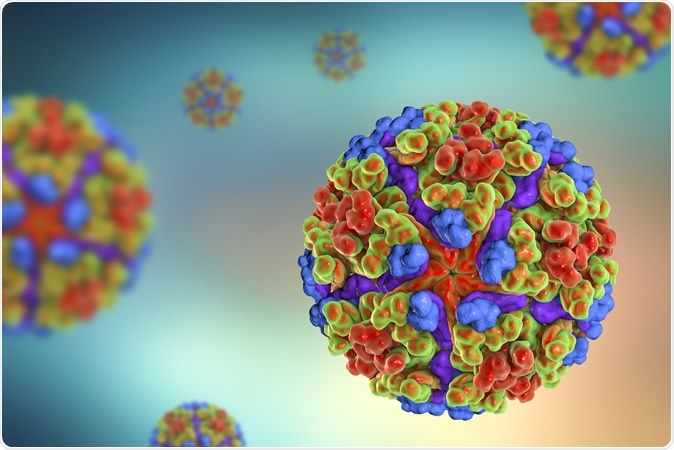A virus-like particle vaccine was shown to be safe and well-tolerated among a healthy adult population living in chikungunya endemic areas, the researchers report in a new study published in the Journal of the American Medical Association (JAMA).
Even though all the attention and resources are currently directed towards severe acute respiratory syndrome coronavirus 2 (SARS-CoV-2) and coronavirus disease (COVID-19), other threats such as the Chikungunya virus can also cause substantial morbidity and, therefore, should not be neglected entirely.
Chikungunya – a continually evolving virus
Chikungunya virus was discovered in the early 1950s after an outbreak in present-day Tanzania. Over the decades, it evolved and affected millions of people in outbreaks across Africa, South America, Asia, and the Caribbean, while smaller outbreaks have been described in Europe as well.
This infectious agent is transmitted by mosquitos from the genus Aedes, causing a febrile disease characterized by joint inflammation and rashes. However, up to 50% of patients may experience debilitating arthritis and fatigue for years after the initial infection.
In addition, Chikungunya virus infections have been linked to a myriad of other complications – including autoimmune disorders, heart problems (cardiomyopathies), and neurological conditions. Therefore, the focus on vaccine development is warranted.

Chikungunya virus, 3D illustration. Emerging mosquito-borne RNA virus from Togaviridae family that can cause outbreaks of a debilitating arthritis-like disease. Illustration Credit: Kateryna Kon / Shutterstock
Virus-like particle (VLP) vaccine: from laboratory to phase 2 clinical trial
Among candidate vaccines for Chikungunya virus, virus-like particle (VLP) vaccines (which are already in use for hepatitis B and human papillomavirus) show an exceptional profile of both safety and effectiveness. Such vaccines mimic authentic native viruses, but lack the viral genome and are thus not infectious.
In 2010, the Vaccine Research Center of the National Institute of Allergy and Infectious Diseases (US National Institutes of Health) developed a candidate Chikungunya VLP vaccine, and phase 1 dose-escalation trial on 25 human participants conducted in 2014 revealed it was both safe and highly immunogenic.
In the current issue of JAMA, the results of a phase 2 placebo-controlled randomized clinical trial with the same vaccine, conducted on 400 participants in a Chikungunya endemic area, have been reported by the group of authors known as the VRC 704 Study Team.
Primary outcomes were safety (concentrating on adverse events and laboratory parameters) and tolerability (potential reactogenicity) of the vaccine. In contrast, the secondary outcome was the immune response four weeks after the second vaccination.
Encouraging results
The Chikungunya virus VLP vaccine is the only protein-based vaccine currently being evaluated in clinical testing", explain study authors led by Dr. Grace L. Chen from the Clinical Trials Program, Vaccine Research Center, National Institute of Allergy and Infectious Diseases (US National Institutes of Health).
And the results are encouraging. "The Chikungunya virus VLP vaccine was well tolerated, with no serious adverse events related to the vaccine were reported," they conclude according to the obtained results.
Observed adverse events were mostly mild, such as reaction at the injection site in 32 percent of vaccine recipients (in comparison to 19 percent in the control group). Moreover, all adverse reactions appraised as potentially related to the studied vaccine resolved without any clinical consequences.
The critical finding was that high levels of neutralizing antibodies were demonstrated at week 8 in vaccine recipients, and the persistence of neutralizing antibodies was shown at week 72 (even though there was a notable drop in their levels).
However, phase 3 trials are now needed to adequately assess clinical efficacy, primarily to address the exact correlates of protection and long-term vaccine safety.
Ahead of the mutagenic curve
It is known that the Chikungunya virus is prone to mutations that have led to improved spread to temperate regions and an expanded number of potential hosts. Does the tested vaccine ensure that we can stay ahead of the changing nature of the virus?
"It is reassuring that antibodies produced by this VLP vaccine in mice, nonhuman primates, and humans in the phase 1 trial do neutralize pseudo-typed chikungunya virions of different genotypes", explain Dr. Mark J. Mulligan and Dr. Kenneth Stapleford from the NYU Langone's Department of Microbiology of the NYU Grossman School of Medicine.
"For chikungunya virus, it is only a matter of time before the further spread of this agent of disabling viral arthritis occurs in the Americas," they conclude. Therefore, it is pivotal to keep insisting on developing the vaccine and other countermeasures for this essential human pathogen – regardless of the global focus on the COVID-19 pandemic.